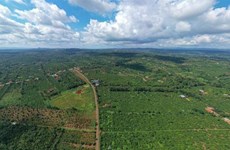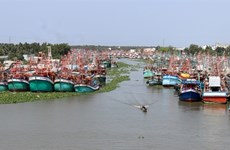Green infrastructure for small and medium sized cities discussed
Mega-cities and big cities have endured dangerous impact from climate
change, but small- and medium-sized towns will suffer the most,
according to experts.
Mega-cities and big cities have endured dangerous impact from climate
change, but small- and medium-sized towns will suffer the most,
according to experts.
Like many other towns of its size in the world, Can Tho has faced many challenges, including rapid urbanisation, climate change and increasing urban population, Assila Pathirana, representative of the Netherlands-based UNESCO-IHE Institute for Water Education, said.
Pathirana spoke at an international conference held in Can Tho on climate-change adaptation and green infrastructure for medium-sized cities on July 23.
Can Tho, with a population of 1.2 million, is located on a land depression in the Mekong River delta, and is surrounded by the Hau river system, a branch of the Mekong River.
Water is a rare resource but also a potential threat to the city, Pathirana added.
In recent time, the Hau River's water level has risen due to unsustainable development activities of Mekong River upstream nations.
Climate change, which has increased the average temperature, has caused more thunderstorms and whirlwinds.
"However, daily human activities have also been responsible for severe flooding, as well as dry weather, land erosion and saltwater intrusion," said Ky Quang Vinh, Director of the Can Tho Climate Change Co-ordination Office.
"Therefore, stabilising livelihoods for the local resident community and developing a green economy is required, which Can Tho's authority will put into practice," he added.
Vinh also said the Can Tho City People's Committee has set up a steering committee for climate change and a climate change co-ordination office.
International experts from the Bangladesh Delta Master Planning Project said that managers and scientists should learn from real experiences of global cities to build development plans and solutions for a sustainable future.
Sharing and learning experiences from studies about several medium-sized cities in the world would help cities increase their own capability in flood prevention and green infrastructure development, while maintaining economic growth and the local community's livelihood, Pathirana said.
According to a report from the Netherlands-based UNESCO-IHE Institute for Water Education, the world has had the fastest urbanisation rate in human history in recent times.
Around 50 percent of the global population now lives in cities and the rate is increasing.
Urbanisation is continuing to occur rapidly in poor and developing nations, and in small- and medium-sized towns, where 70 percent of the world's urban population lives.
Urbansation is putting pressure on cities and town authorities to develop solutions to accommodation, public services, environmental pollution, flooding and climate change impact.-VNA
Like many other towns of its size in the world, Can Tho has faced many challenges, including rapid urbanisation, climate change and increasing urban population, Assila Pathirana, representative of the Netherlands-based UNESCO-IHE Institute for Water Education, said.
Pathirana spoke at an international conference held in Can Tho on climate-change adaptation and green infrastructure for medium-sized cities on July 23.
Can Tho, with a population of 1.2 million, is located on a land depression in the Mekong River delta, and is surrounded by the Hau river system, a branch of the Mekong River.
Water is a rare resource but also a potential threat to the city, Pathirana added.
In recent time, the Hau River's water level has risen due to unsustainable development activities of Mekong River upstream nations.
Climate change, which has increased the average temperature, has caused more thunderstorms and whirlwinds.
"However, daily human activities have also been responsible for severe flooding, as well as dry weather, land erosion and saltwater intrusion," said Ky Quang Vinh, Director of the Can Tho Climate Change Co-ordination Office.
"Therefore, stabilising livelihoods for the local resident community and developing a green economy is required, which Can Tho's authority will put into practice," he added.
Vinh also said the Can Tho City People's Committee has set up a steering committee for climate change and a climate change co-ordination office.
International experts from the Bangladesh Delta Master Planning Project said that managers and scientists should learn from real experiences of global cities to build development plans and solutions for a sustainable future.
Sharing and learning experiences from studies about several medium-sized cities in the world would help cities increase their own capability in flood prevention and green infrastructure development, while maintaining economic growth and the local community's livelihood, Pathirana said.
According to a report from the Netherlands-based UNESCO-IHE Institute for Water Education, the world has had the fastest urbanisation rate in human history in recent times.
Around 50 percent of the global population now lives in cities and the rate is increasing.
Urbanisation is continuing to occur rapidly in poor and developing nations, and in small- and medium-sized towns, where 70 percent of the world's urban population lives.
Urbansation is putting pressure on cities and town authorities to develop solutions to accommodation, public services, environmental pollution, flooding and climate change impact.-VNA













